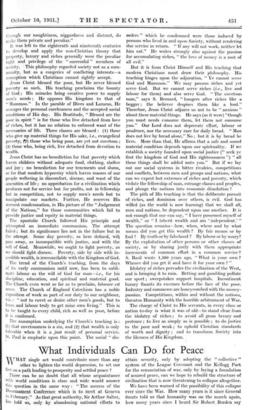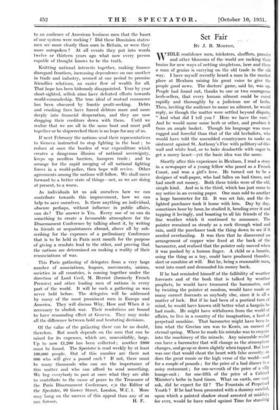What Individuals Can Do for Peace
There can be no doubt that all whose acquaintance with world conditions is close and wide would answer this question in the same way : " The success of the Disarmament Conference which is to meet at Geneva in February." As that great authority, Sir Arthur Salter, has told us, only by abandoning national efforts to WHAT. single act would contribute more than any other to lighten the world depression, to set our feet on a path leading.to prosperity and settled peace ? attain security, only by adopting the " collective " system of the League- Covenant and the Kellogg Pact for the renunciation of war, only by laying a foundation of assured peace, can we hope to rebuild the structure of civilization that is now threatening to collapse altogether.
We have been warned of the possibility of this collapse ever since the War. How many years is it since General Smuts told us that humanity was on the march again, how many years since I heard Sir Robert Borden say to an audience of American business men that the bases of our system were rocking ? Did these Dominion states- men see more clearly than ours in Britain, or were they more outspoken ? At all events they put into words twelve or thirteen years ago what now every person capable of thought knows to be the truth.
Knitting national interests together, making finance disregard frontiers, increasing dependence on one another in trade and industry, seemed at one period to promise friendlier relations, an easier flow of wealth for all. That hope has been hideously disappointed. Year by year short-sighted, selfish aims have defeated efforts towards world-comradeship. The true ideal of mutual commerce has been obscured by frantic profit-seeking. Debts and crushing fines have forced debtors more and more deeply into financial desperation, and they are now dragging their creditors down with them. Until we realize that we are all in the same boat and must pull together or be shipwrecked there is no hope for any of us.
If next February the nations send their representatives to Geneva instructed to stop fighting in the boat ; to reduce at once the burden of war expenditure which creates a dangerous illusion of national sovereignty, keeps up needless barriers, hampers trade ; and to arrange for the rapid merging of all national fighting forces in a world-police, then hope will revive. Other agreements among the nations will follow. We shall Move forward to a better state of things—not, as we are doing at present, to a worse.
As individuals let us ask ourselves how we can contribute towards this improvement, how we can help to save ourselves. Is there anything an individual, obscure perhaps, without influence in public affairs, can do ? The answer is Yes. Every one of us can do something to create a favourable atmosphere for the Disarmament Conference by talking about it, by writing to friends or acquaintances abroad, above all by sub- scribing for the expenses of a preliminary Conference that is to be held in Paris next month for the purpose of giving a resolute lead to the other, and proving that the nations are determined on making a reality of their renunciations of war.
This Paris gathering of delegates from a very large number of associations, leagues, movements, unions, societies in all countries, is coming together under the direction of Lord Cecil, M. Herriot (formerly French Premier) and other leading men of nations in every part of the world. It will be such a gathering as was never held before. The delegates will be • addressed by many of the most prominent men in Europe and America. They will discuss Why, How and When it is necessary to abolish war. Their resolutions are bound to have resounding effect at Geneva. They may make all the difference between bold and hesitating decisions.
Of the value of the gathering there can be no doubt, therefore. But much depends on the sum that can be raised for its expenses, which are, unavoidably, large. Up to now £1,200 has been collected ; another £800 must be found. The Spectator is read weekly by at least 100,000 people. Out of this number are there not 800 who will give a pound each ? If not, there must be many thousands who can see the importance of this matter and who can afford to send something. We beg everybody to post at once what they are able to contribute to the cause of peace to the Treasurer of the Paris Disarmament Conference, c/o the Editor of the Spectator, 99 Gower Street, London, W.C. 1. More may hang on the success of this appeal than any of us



















































 Previous page
Previous page